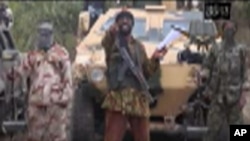DAKAR —
The abduction of nearly 300 girls from a secondary school in northeastern Nigeria has vaulted the leader of militant Islamist sect Boko Haram into the international spotlight. Abubakar Shekau transformed the sect into a jihadist army capable of increasingly brutal attacks.
He's been portrayed as a bloodthirsty mad man and a highly intelligent, fearless leader. And that's just according to the man himself. Experts say there's likely truth to both depictions.
Abubakar Shekau claimed responsibility for the attack on the military's Giwa barracks in March in Maiduguri.
"It is now that you will really understand me," he declared. "You don't know my madness, right? It is now that you will see. By Allah, I will slaughter you."
He also claimed responsibility in the video for kidnapping the nearly 300 schoolgirls on April 14.
"Do you think I will stop Allah's work? I am not mad. It is you that is mad…. I know my religion well," he noted. "I am not illiterate... Even if you kill me, other fighters will rise up better than me. I am nothing and worthless before God who I am working for. That is the Islam you do not know."
The militant leader laughed and pledged to sell the schoolgirls into slavery. His smiling, fidgety delivery has people calling him a maniac.
Much of the 56-minute diatribe, which he read from papers he was holding, is on par with his usual mix of threats and ideology. It's a belief system Shekau has been preaching since well before he traded in his traditional robes for military fatigues.
He considers democracy a form of "paganism" and sees Western education as a conspiracy to corrupt and destroy Islam.
Boko Haram began in 2002 in northeastern Nigeria. The sect went underground in 2009 after a police crackdown and the killing of founder Mohammed Yusuf. Shekau, Yusuf's deputy, took over.
From preacher to militant Islamist leader
By that time, Shekau had already made a name for himself as a learned Islamic scholar, a hard-liner and a persuasive preacher.
A video from those days shows Shekau the preacher, dressed in white, giving a sermon. From an ideological standpoing, it's eerily similar in content to the videos he now sends into the world from hiding. This "journey we have undertaken," he says at the end, is the will of God.
Shekau rules out negotiation and says followers must create their own Islamic state.
He commands an army of what experts say is hundreds of heavily armed fighters. Shekau has been declared dead at least twice, only to re-emerge.
Under his leadership, the group has broadened its international ties and carried out attacks in Nigeria ranging from suicide car bombings to assassinations. Muslims, Christians, civilians, military - no one has been spared. Thousands have been killed. The attacks have grown in scale and brutality.
VOA viewed a recent internal Boko Haram video depicting militants beheading what appear to be captured Nigerian soldiers. In his most recent video, Shekau referred to enslaving and "harvesting the necks" of infidels, which he says "have no value" and include all who are against them.
He's been portrayed as a bloodthirsty mad man and a highly intelligent, fearless leader. And that's just according to the man himself. Experts say there's likely truth to both depictions.
Abubakar Shekau claimed responsibility for the attack on the military's Giwa barracks in March in Maiduguri.
"It is now that you will really understand me," he declared. "You don't know my madness, right? It is now that you will see. By Allah, I will slaughter you."
He also claimed responsibility in the video for kidnapping the nearly 300 schoolgirls on April 14.
"Do you think I will stop Allah's work? I am not mad. It is you that is mad…. I know my religion well," he noted. "I am not illiterate... Even if you kill me, other fighters will rise up better than me. I am nothing and worthless before God who I am working for. That is the Islam you do not know."
The militant leader laughed and pledged to sell the schoolgirls into slavery. His smiling, fidgety delivery has people calling him a maniac.
Much of the 56-minute diatribe, which he read from papers he was holding, is on par with his usual mix of threats and ideology. It's a belief system Shekau has been preaching since well before he traded in his traditional robes for military fatigues.
He considers democracy a form of "paganism" and sees Western education as a conspiracy to corrupt and destroy Islam.
Boko Haram began in 2002 in northeastern Nigeria. The sect went underground in 2009 after a police crackdown and the killing of founder Mohammed Yusuf. Shekau, Yusuf's deputy, took over.
From preacher to militant Islamist leader
By that time, Shekau had already made a name for himself as a learned Islamic scholar, a hard-liner and a persuasive preacher.
A video from those days shows Shekau the preacher, dressed in white, giving a sermon. From an ideological standpoing, it's eerily similar in content to the videos he now sends into the world from hiding. This "journey we have undertaken," he says at the end, is the will of God.
Shekau rules out negotiation and says followers must create their own Islamic state.
He commands an army of what experts say is hundreds of heavily armed fighters. Shekau has been declared dead at least twice, only to re-emerge.
Under his leadership, the group has broadened its international ties and carried out attacks in Nigeria ranging from suicide car bombings to assassinations. Muslims, Christians, civilians, military - no one has been spared. Thousands have been killed. The attacks have grown in scale and brutality.
VOA viewed a recent internal Boko Haram video depicting militants beheading what appear to be captured Nigerian soldiers. In his most recent video, Shekau referred to enslaving and "harvesting the necks" of infidels, which he says "have no value" and include all who are against them.














